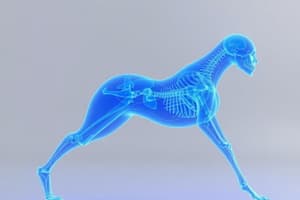Podcast
Questions and Answers
As you push a door open while walking, you subconsciously lean forwards a bit to ensure that you don't get knocked off balance backwards. What level of postural control is governing this action?
As you push a door open while walking, you subconsciously lean forwards a bit to ensure that you don't get knocked off balance backwards. What level of postural control is governing this action?
- Autonomic (correct)
- Anticipatory
- Voluntary
- Reflexive
What are the four stages of learning in the Fitts and Posner's 3-Stage Model?
What are the four stages of learning in the Fitts and Posner's 3-Stage Model?
The four stages of learning in the Fitts and Posner's 3-Stage Model are the cognitive stage, the associative stage, and the autonomous stage. The verbal-cognitive stage is a precursor to the cognitive stage.
What are the two main categories of skills?
What are the two main categories of skills?
The two main categories of skills are open skills and closed skills.
What is the name often given to the cognitive stage of learning?
What is the name often given to the cognitive stage of learning?
The associative stage is the stage where the learner begins to make fewer errors and improve their performance.
The associative stage is the stage where the learner begins to make fewer errors and improve their performance.
Which of the following is NOT a characteristic of the autonomous stage?
Which of the following is NOT a characteristic of the autonomous stage?
What is the difference between the Fitts and Posner's 3-stage model and Gentile's 2-stage model?
What is the difference between the Fitts and Posner's 3-stage model and Gentile's 2-stage model?
What is the main objective of the "Fixation and diversification" stage?
What is the main objective of the "Fixation and diversification" stage?
What is the main difference between an expert player and a novice player when it comes to visual search patterns?
What is the main difference between an expert player and a novice player when it comes to visual search patterns?
The term "supertasker" refers to someone who is very skilled at multitasking.
The term "supertasker" refers to someone who is very skilled at multitasking.
What does the "bottleneck" refer to in the context of information processing?
What does the "bottleneck" refer to in the context of information processing?
Which of the following is not a component of creativity in sport and games?
Which of the following is not a component of creativity in sport and games?
What are the two main learning stage theories discussed?
What are the two main learning stage theories discussed?
What is the primary characteristic of the Cognitive stage in Fitts and Posner's model?
What is the primary characteristic of the Cognitive stage in Fitts and Posner's model?
Explain the primary differences between the Associative and Autonomic stages in Fitts and Posner's model?
Explain the primary differences between the Associative and Autonomic stages in Fitts and Posner's model?
What is the key difference between Gentile's and Fitts and Posner's models?
What is the key difference between Gentile's and Fitts and Posner's models?
What is the concept of 'psychological refractory period' (PRP) in information processing?
What is the concept of 'psychological refractory period' (PRP) in information processing?
The psychological refractory period (PRP) primarily affects the response selection stage in information processing.
The psychological refractory period (PRP) primarily affects the response selection stage in information processing.
Which of these is not directly related to the 'knowledge structure and information processing' aspect of expertise?
Which of these is not directly related to the 'knowledge structure and information processing' aspect of expertise?
Explain the principle of 'Degrees of Freedom' in relation to motor skill expertise.
Explain the principle of 'Degrees of Freedom' in relation to motor skill expertise.
The 'Multiple Resource Theory' suggests that our CNS has unlimited but inflexible processing resources.
The 'Multiple Resource Theory' suggests that our CNS has unlimited but inflexible processing resources.
What is a key aspect of the 'Multiple Resource Theory' regarding the impact of similar tasks?
What is a key aspect of the 'Multiple Resource Theory' regarding the impact of similar tasks?
Flashcards
Postural control levels
Postural control levels
Subconscious, innate, learned, and autonomic processes controlling body position.
Movement stages
Movement stages
Progressive phases in learning a motor skill.
Creativity in sport
Creativity in sport
Generating unique, versatile, and effective movements.
Fitts & Posner model
Fitts & Posner model
Signup and view all the flashcards
Gentile's model
Gentile's model
Signup and view all the flashcards
Cognitive stage
Cognitive stage
Signup and view all the flashcards
Associative stage
Associative stage
Signup and view all the flashcards
Autonomic stage
Autonomic stage
Signup and view all the flashcards
Expert performers
Expert performers
Signup and view all the flashcards
Knowledge structure
Knowledge structure
Signup and view all the flashcards
Information processing
Information processing
Signup and view all the flashcards
Multiple Resource theory
Multiple Resource theory
Signup and view all the flashcards
Psychological refractory period (PRP)
Psychological refractory period (PRP)
Signup and view all the flashcards
Serial processing
Serial processing
Signup and view all the flashcards
Double Stimulation Paradigm
Double Stimulation Paradigm
Signup and view all the flashcards
Learning styles
Learning styles
Signup and view all the flashcards
Intermuscular coordination
Intermuscular coordination
Signup and view all the flashcards
Intramuscular coordination
Intramuscular coordination
Signup and view all the flashcards
Coordination and movement efficiency
Coordination and movement efficiency
Signup and view all the flashcards
Information Filtering
Information Filtering
Signup and view all the flashcards
Visual search patterns
Visual search patterns
Signup and view all the flashcards
What is information processing?
What is information processing?
Signup and view all the flashcards
What is multiple resource theory?
What is multiple resource theory?
Signup and view all the flashcards
What is a bottleneck?
What is a bottleneck?
Signup and view all the flashcards
What is the PRP?
What is the PRP?
Signup and view all the flashcards
What is serial processing?
What is serial processing?
Signup and view all the flashcards
What is the double stimulation paradigm?
What is the double stimulation paradigm?
Signup and view all the flashcards
Why does the second reaction time get slower?
Why does the second reaction time get slower?
Signup and view all the flashcards
How does PRP relate to sports?
How does PRP relate to sports?
Signup and view all the flashcards
What is the concept of multiple resources?
What is the concept of multiple resources?
Signup and view all the flashcards
How does multiple resources relate to interaction?
How does multiple resources relate to interaction?
Signup and view all the flashcards
What is meant by attention resources?
What is meant by attention resources?
Signup and view all the flashcards
How does multitasking affect information processing?
How does multitasking affect information processing?
Signup and view all the flashcards
What is automatic performance?
What is automatic performance?
Signup and view all the flashcards
How does automaticity relate to skill level?
How does automaticity relate to skill level?
Signup and view all the flashcards
What are some key characteristics of expert performers?
What are some key characteristics of expert performers?
Signup and view all the flashcards
How does knowledge structure contribute to expertise?
How does knowledge structure contribute to expertise?
Signup and view all the flashcards
How does information processing differ between experts and novices?
How does information processing differ between experts and novices?
Signup and view all the flashcards
Why are expert visual search patterns different?
Why are expert visual search patterns different?
Signup and view all the flashcards
How does coordination differ between experts and novices?
How does coordination differ between experts and novices?
Signup and view all the flashcards
How does coordination relate to movement efficiency?
How does coordination relate to movement efficiency?
Signup and view all the flashcards
What is intermuscular coordination?
What is intermuscular coordination?
Signup and view all the flashcards
What is intramuscular coordination?
What is intramuscular coordination?
Signup and view all the flashcards
What is the goal of motor learning?
What is the goal of motor learning?
Signup and view all the flashcards
How do learning stages differ from beginner, intermediate, and expert?
How do learning stages differ from beginner, intermediate, and expert?
Signup and view all the flashcards
Why is automaticity not the same as being an expert?
Why is automaticity not the same as being an expert?
Signup and view all the flashcards
How can we use learning stage models to guide practice and training?
How can we use learning stage models to guide practice and training?
Signup and view all the flashcards
Study Notes
Motor Learning
- In-class review (Nov 13): A class review session focused on postural control. A majority (53.6%) of the class correctly identified anticipatory postural control as the primary type of control during a simple action, like opening a door while walking. The other categories (reflexive, voluntary, autonomic) were answered incorrectly by the majority.
- Today's learning objectives: The instructor outlined the learning objectives for the session, which involved understanding stages of movement, learning models, and characteristics of high-performance performers. This included outlining basic movement stages, describing learning models, identifying strengths of high-performance performers versus low performers, how to plan future training using learning models, and the different stages of learning in motor skill development.
- Creativity in learning: Creativity in sport and games includes originality (creating new actions), versatility (producing variations), efficacy (executing many effective movements), and the willingness to explore movements through trial and error. Creativity grows with free expression and exploration, along with mastery of a skill.
- Stages of Learning: Learned motor skills pass through various stages over time. Different aspects of the motor skill become more or less important throughout the learning process. Two theories that address the stages include: Fitts and Posner's 3-stage model and Gentile's 2-stage model. The models describe performance changes from stage to stage, along with the learning process and instruction that occur at each stage.
- Verbal-Cognitive Stage (Cognitive Stage): This is the first stage of learning. Characteristics include verbal-cognitive activities, large errors, and poor efficiency. Motor skill performance changes are not reflected in this stage, but it is dominated by cognitive factors. The learner learns the rules, strategies, and basic movement concepts for a skill.
- Associative Stage: Learners are able to recognize errors, associate movement actions with their outcomes, and performance variations decrease. This stage is characterized by a reduction of mistakes along with developing associations and outcomes.
- Autonomic Stage: This is the final stage of learning. Characterized by an ability to correct errors and execute tasks consistently, with limited attention demands, and high efficiency.
- Information Processing and Multiple Resource Theory: The theory posits that the central nervous system processes information through a series of steps. These steps include: internal and external sensory input, perception, selection of response, and executing the response.
- Double Stimulation Paradigm: This paradigm investigates how the central nervous system handles multiple stimuli and whether it can complete two tasks simultaneously. Separations between tasks measured in milliseconds.
- Knowledge Structure and Information Processing: Experts tend to have an improved knowledge structure and faster information processing. Early learners often focus on the immediate stimulus. Effective learners process information more efficiently and more time is spent on important cues.
- Change How the Goal of a Skill is Achieved: As learners improve, they accomplish goals differently. An example: expert boxers emphasize defensive moves over attacks. The achievement of goals depends on the task, the learner's knowledge base, and skill set.
- Better Coordination and Movement Efficiency: Intermuscular and intramuscular coordination become more efficient over time, along with a reduction of unnecessary movements. Experts link limb segments differently and release degrees of freedom, leading to more control over their movements. Interpersonal coordination skills develop progressively, as seen in competing sports like soccer, for instance.
- Learning Styles: Learning Styles are a myth. People learn best when information is applied in a variety of ways, not just a single one.
Studying That Suits You
Use AI to generate personalized quizzes and flashcards to suit your learning preferences.




